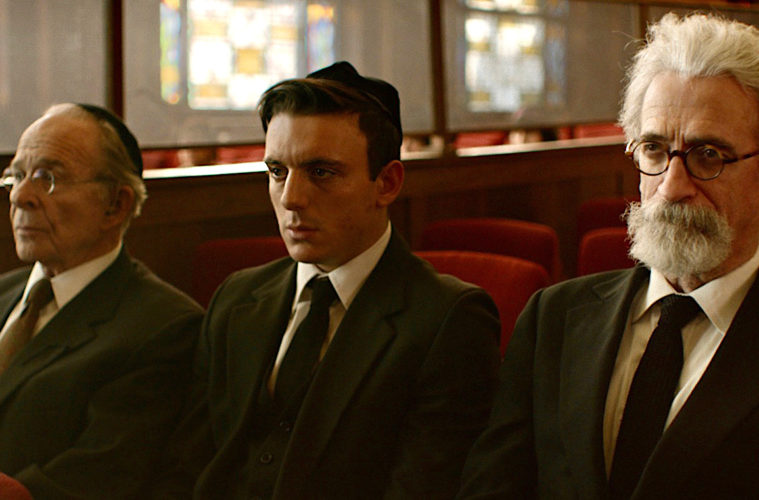In Eric Steel’s Minyan, the documentary filmmaker’s beautifully observed debut feature, a young gay man seeks to reconcile his growing self-awareness with the traditions of his Orthodox Jewish family.
When he walks into Nowhere, the East Village gay bar, circa 1986, David (Samuel H. Levine), a seventeen year old yeshiva student, asks for vodka but is clearly not of age. It’s late afternoon and the bar is empty except for a rugged bartender (Alex Hurt), and a clearly seasoned, possibly bitter young guy (Chris Perfetti) sitting by the door who says, “Come on, can’t you see the boy needs a drink? I mean, look at him.”
It’s true that David appears to be what he is: someone’s tightly wound proper good son. At 17, he has begun seeking out ways to be a good son and an observant Russian Jew, as well as a man who loves men. To cover his new habit of staring for too long at some of his classmates, David keeps picking fights. When his grandfather, Josef (the great Ron Rifkin), sees David’s black eye, he asks no questions, except to say, “all the answers are in the book. Everything. It’s all in the book.”
Josef means the Torah, but a fumbling sex life that takes an unexpectedly adult turn, along with readings by a wonderfully passionate new English teacher (Chinaza Uche), send David to a newer text: the words of James Baldwin, whose eloquent fury expands David’s worldview and energizes this low-key film. Between the Torah, Baldwin and the stories of Russian master Isaac Babel, this is a film rich with quoted language.
Steel and co-writer Daniel Pearle adapted Minyan from the closing story in David Bezmozgis’s acclaimed 2004 book, Natasha: And Other Stories. In the short story, the narrator (the David character) recounts Josef’s struggle to find a new apartment after his wife’s death. There is intense competition for subsidized housing for the Jewish elderly. The waiting lists are years long. “Always lists,” Josef says in the film.
In the story and film, he learns of a nice apartment in a Brighton Beach building, but there’s a glitch. The manager (the building’s gabbai) hosts Shabbat services in the building’s one-room synagogue but to do so each week he needs a quorum of 10 men: a minyan. Josef as a tenant would bring them to nine. When David agrees to be his roommate, a minyan is achieved, for a while at least.
The screenwriters are reverently faithful to Bezmozgis’s tale but have expanded it to include David’s personal life, setting the story in late 1980s New York. Just as David is coming to terms with his sexuality, AIDS is taking gay lives left and right. While Steel and Pearle fail to find the space to do justice to those losses and what they’ll mean for someone like David, they do include a wrenching call-back to Josef’s observation about the inescapability of lists.
There’s a fine visual subtlety to Steel’s storytelling. After the grandmother’s funeral, David and Josef adroitly mend the collars they tore as an act of mourning. Later, David finds an old photo of himself as a child, sitting on a sofa between his grandparents. Half turning from the table, he holds the photo up to the sofa behind him, and indeed, it’s the same couch. That drab old piece of furniture, which David and his friend Nate (Zane Pais) will lug to the new apartment, holds within it the family’s oft-told tales of the lost and the dead. Turning to look at it, David appears to realize that he’s become the family’s memory, which is as much a tradition as the rending of cloth.
Levine has the haunted, angelic beauty of a young Al Pacino, and a similar gift for holding a close-up. Two years ago, to clamorous acclaim, he played a dual role in the Tony-winning Broadway play, The Inheritance, but even with that credit, there is a thrilling sense of discovery to Levine’s performance in Minyan. He’s working from such a deep place that by film’s end, he leaves us wondering, for years to come, no doubt, what happens next for David, and who he’ll become.
Minyan is available via VOD now.
Read more of Chuck Wilson’s film reviews here.
Advertising disclosure: We may receive compensation for some of the links in our stories. Thank you for supporting LA Weekly and our advertisers.

